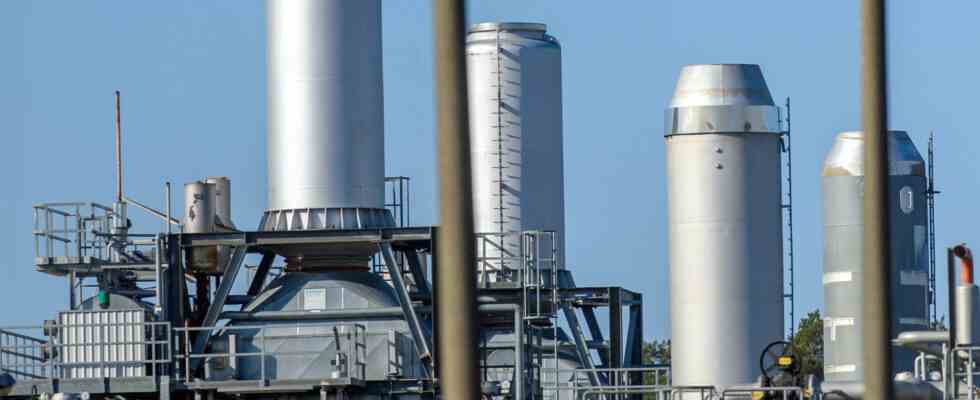Status: 04/20/2022 12:35 p.m
Germany wants to free itself from dependence on Russian gas. How much potential is there in domestic natural gas production – and what role could the controversial fracking play?
Gas production in Germany has been declining sharply for years. According to the Federal Association for Natural Gas, Oil and Geoenergy (BVEG), 5.2 billion cubic meters were produced in Germany in 2021. Most comes from onshore funding in Lower Saxony. According to the BVEG, in 2001 21 percent of gas consumption in Germany came from domestic production.
“Funding has been falling for years”
There are various reasons for the continuous decline in funding. According to Eike Bruns, spokesman for the State Office for Mining, Energy and Geology (LBEG), the socio-political debates and tightened approval procedures are primarily responsible. “Natural gas production in Germany has been in decline for years. It was simply more lucrative to obtain gas from other regions and countries than to produce your own,” Bruns said tagesschau.de.
The BVEG therefore estimates the expansion potential of natural gas production in Germany to be rather low. “The aim will be to keep production at the current level, maybe to increase it slightly. That in itself is a very important step for security of supply.” It is realistic to increase the share of in-house production in natural gas consumption from the current five to six percent and thus to around six billion cubic meters.
Significant amounts only possible with fracking?
Really relevant increases in gas quantities – about a doubling – would require shale gas production, i.e. the use of fracking technology. “There is no social or political support for this. The industry understands that and respects it,” said Miriam Ahrens, spokeswoman for the BVEG tagesschau.de.
Nevertheless, Michael Hüther, head of the German Economic Institute, calls for a serious examination of the controversial technology. “In principle, every option must be examined and seriously considered for a quick exit from Russian gas,” he told the “Rheinische Post”. This “of course” also applies to fracking and gas production in Germany. The North Rhine-Westphalian Economics Minister Andreas Pinkwart, like Bavaria’s Prime Minister Markus Söder before him, spoke out in favor of an open-ended examination of gas fracking.
According to LBEG spokesman Bruns, the expansion of domestic production volumes can only work if new deposits are found and developed. “However, this requires time, high investments and specialist staff who have left in recent years due to a lack of funding.” According to Bruns, the entire process, from test drilling to developing a production field, should take at least three years.
Untapped deposits in the North Sea
Overall, Germany’s demand for natural gas is currently around 90 billion cubic meters per year. Some politicians in the federal government are hoping for untapped supplies that are stored off the German-Dutch coast. The Dutch company One-Dyas plans to extract natural gas from a field discovered in 2017 in the Wadden Sea between the Dutch island of Schmiermonnikoog and Borkum. The platform, which is scheduled to go into operation in winter 2024, should be able to produce around two billion cubic meters of gas annually.
While the Dutch authorities have approved the natural gas extraction project, the federal government is divided. The spokesman for energy policy of the FDP parliamentary group, Michael Kruse, recently called for an expansion of natural gas production in Germany. In view of the temporary stop of the Nord Stream 2 Baltic Sea pipeline, natural gas production in the North Sea is “an important element for more independence in gas supply”.
Resistance from Greens and environmental groups
The Greens, on the other hand, reject an expansion of natural gas production in Germany. They criticize that natural gas production violates the state’s own climate law, which provides for climate neutrality by 2045. Environmental groups are also against natural gas production in the North Sea. With regard to One-Dyas’ application, the German Nature Conservation Union (Nabu), for example, stated that the intended location of the production and processing platform borders directly on the Lower Saxony Wadden Sea National Park, which enjoys special protection as a natural world heritage site.
On the German side, the state government of Lower Saxony, which has so far rejected the Dutch company’s project, is responsible for approving One-Dyas’ application. “Against the background of the new geopolitical realities and the associated question of German energy supply security, we have reassessed the topic,” said Wolfgang Steiger, Secretary General of the Economic Council of the CDU. Finance Minister Christian Lindner is also in favor of gas production in the North Sea. “To put it bluntly, I think the coalition agreement’s stipulation that we no longer want to produce oil and gas in the North Sea and we don’t want to explore new fields is out of date,” he told The European magazine.

